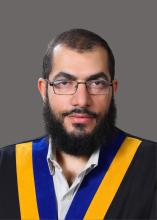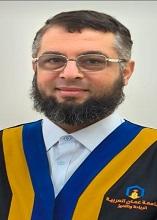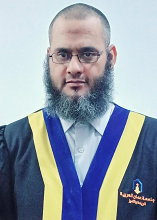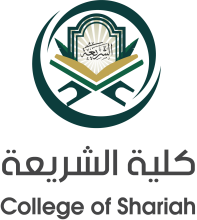Sharia and Islamic Studies - Faculty of Sharia at Amman Arab University is one of the distinguished academic departments, seeking to create an educational and academic atmosphere to cope with the requirements of the century and reinforce tolerance and moderation of Islam.
This Department includes various nationalities in and outside the Kingdom to study Islamic sciences based on the moderate Islamic Sharia.
The study plan of this Department is distinctive and comprehensive, covering all fields of Islamic sciences which may create a qualified comprehensive and Islamic personality to serve our secured Islamic nation and Hashemite Kingdom of Jordan.
Our students achieved 100% in the proficiency exam for many successive years and our Faculty ranking was advanced among the State Universities. All the above mentioned may enrich labor market (public and private sectors) with qualified cadres provided with scientific and realistic tools capable to confront all challenges and find solutions for the recent events.
Dr. Kifah Al-Souri
Acting Head of the Department
Islamic Studies Science is one of the most prominent sciences. This Department was established in 2016 as a department of faculty of law. Faculty of Sharia was established in 2020 due to its significance and the increasing need, and annexed this Department to Faculty of Sharia. This Department aims to strengthen Islamic Studies in many fields such as: Holy Quran, Tafsir, recitation of Quran, Hadith and its science, biography of Prophet Mohammad, Islamic Ideology and Jurisprudence.
Why this Major?
This major aims to refine the Islamic personality; loyal to its religion and nation, capable to understand the Islamic sciences and combine between modernity and authenticity based on the Islamic legislation. This Department aims also to graduate Islamic scientific qualifications coping with the current century in various fields such as education, legitimate justice, deliverance of legal opinion, Islamic institutes internally and externally, family counseling, attorneyship, Islamic economy, invocation and rhetoric.
Vision
Pioneering in building an interactive jurisprudential personality that combines tradition and modernity at the local, regional and international levels.
Mission
Preparing distinguished staff with the ability to understand Islamic law and its origins, and to provide jurisprudential solutions to the developments of the times, to meet the needs of the local, regional and global community, in accordance with local and international quality criteria.
Program Mission (Bachelor Program - Sharia):
Providing the local, international and regional community with distinguished competencies in the sciences of Islamic law, based on moderation.
Educational Program Objectives:
- Acquiring the student set of legitimate rules and bases which are extracted from their legitimate sources.
- Enabling the jurisprudent ability for the student in the Islamic faith, call and religious address.
- Enhancing the critic thinking in students related to legitimate and social issues and consolidation of the middle curriculum.
- Acquiring students the research skills using the original sources and references in Islamic Sharia.
Educational Program Outcomes:
The expected outcomes of this program are preparing graduates competent in:
- Identifying the Holy Quran and its sciences and the methods of considered exegetists.
- Clarifying the sciences of the hadith and its origins according to the Sunnah and its sources.
- Applying perfectly the recitation of the Holy Qur’an in accordance with the provisions and rules of recitation.
- Applying the Islamic belief and its moderate characteristics.
- Deducing the legislative rules from their original sources.
- Preparing solutions for developments in accordance with Islamic jurisprudence and its principles.
Program Mission (Bachelor Program - Jurisprudence and its Origins):
Preparing potential specialized in jurisprudence and its principles, who follow the scientific method based on moderation, contribute to solving community issues, and raise the status of Islam locally and internationally in accordance with the e-learning integration criteria.
Educational Program Objectives (Bachelor Program - Jurisprudence and its Origins):
- Providing students with a set of Sharia rules deduced from their religious sources.
- Empowering the students' jurisprudential ability to find solutions of new issues.
- Improving critical and creative thought in accordance with Sharia criteria.
- Enhancing the research skills for students using original sources and references in Islamic Sharia.
Educational Program Outcomes (Bachelor Program - Jurisprudence and its Origins):
The expected outcomes of this program are preparing graduates competent in:
- Define jurisprudence and its principles and sciences in various fields.
- Recognize Sharia politics, sciences and rulings, focusing on the relationship between them and Islamic jurisprudence and legal religious studies.
- Clarify the sciences of the Holly Qur’an, the Holly Hadith, and the Islamic faith according to the sources of Islamic religion.
- Perfectly apply the recitation of the Holly Qur’an in accordance with the provisions and rules of intonation.
- Derive religious rulings from their original sources using a scientific research method.
- Propose solutions to developments in accordance with Islamic jurisprudence and its principles, jurisprudence rules, and the purposes of Islamic religion.
Program Educational Objectives (PEOs) (Bachelor Program - Jurisprudence and its Origins):
- Providing the student with a set of religious rules deduced from their legislative sources.
- Empowering the student's jurisprudential spirit to find solutions to emerging issues.
- Improving students' critical thinking in religious and social issues and consolidate the middle curriculum.
- Providing the student with research skills by using authentic sources and references in Islamic Sharia’.
Students Outcomes (SOs) (Bachelor Program - Jurisprudence and its Origins):
The intended outcome of this program is to prepare graduates who are able to:
- Introducing the Holy Qur’an, its sciences, and the methods of the respected interpreters.
- Clarifying the sciences of the Holy Hadith and its origins according to the Holy Sunnah and its sources.
- Applying perfectly the recitation of the Holy Qur’an in accordance with the provisions and rules of recitation.
- Applying the Islamic faith and its moderate characteristics.
- Deducing religious rulings from their original sources.
- Preparing solutions for developments in accordance with Islamic jurisprudence and its principles.
Mapping between PEOs and SOs (Bachelor Program - Jurisprudence and its Origins):
| PEOs | SOs |
| 1 | 1, 4 |
| 2 | 1, 4 |
| 3 | 4 |
| 4 | 3 |
| 5 | 1, 2 |
| 6 | 1, 2 |





| Major | Credit Hours | Study Plan |
| Bachelor's of Sharia | 132 | Download plan |
| Fiqh and its Foundation | 132 |







